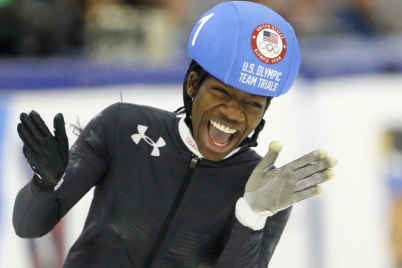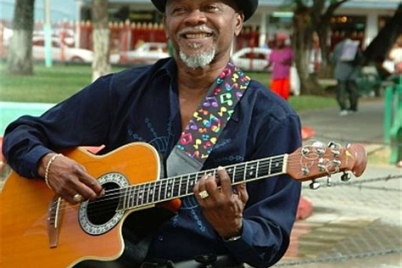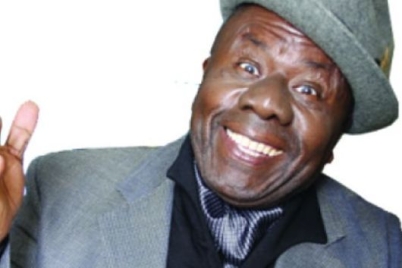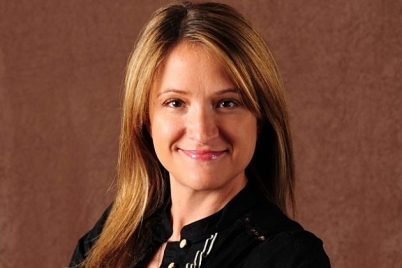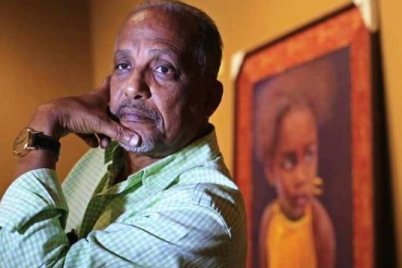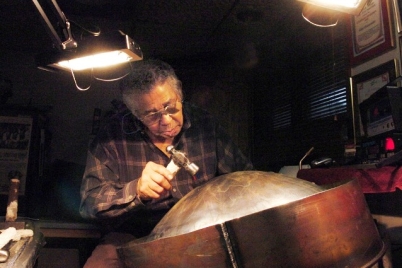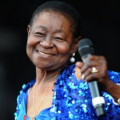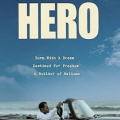World Cup 2018 has come and gone like a bolt of lightning. We are now left with the memories, articles and the social media shares. When it comes to our regionally internationally-excelling sportsmen, can we too leave it to memory, a few articles, and social media shares? We would hope not! Thankfully, some of our great sporting personalities and Caribbean authors have teamed up to create a literary Caribbean Cup of Sporting memories for consumption for generations to come. See some of their profiles below:
Usain Bolt
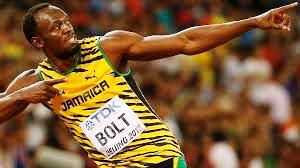 Before Usain Bolt, there was the understanding or would we now say the assumption, that high-performing sprinters did best within a short-medium height-range. ‘The big man’, 6’5, was first spotted by Jamaican coaches at his school for his cricketing and sprinting endeavors where he produced his first silver high school championships medal in the 200-meter race under the tutelage of Pablo Mc Neil.
Before Usain Bolt, there was the understanding or would we now say the assumption, that high-performing sprinters did best within a short-medium height-range. ‘The big man’, 6’5, was first spotted by Jamaican coaches at his school for his cricketing and sprinting endeavors where he produced his first silver high school championships medal in the 200-meter race under the tutelage of Pablo Mc Neil.Donned “the fastest man”; many have theorized the hows of this sprinting great. Dr. Ian Bezodis, Sports Biomechanics Laboratory Director at Cardiff Metropolitan University, suggests it’s about physics, and Newton’s Laws of Motion, being powerful in every ground contact, others the ‘sprinting gene’-ACTN3 https://www.telegraph.co.uk/usain-bolt-worlds-fastest-man/0/built-for-speed-what-makes-usain-bolt-so-fast/. However, what Bolt attested to in an interview, is focusing on his start, maintaining his training regime along with dietary guidelines, mental rehearsing and goal setting.
Bolt, at 27 years old, boasts of what has been described as mind-boggling accomplishments.: having retired from track and field in 2017 after delivering three gold medals at the 2008 Olympic Games in Beijing, China, becoming the first Olympian sprinter in history to win both the 100 and 200 meter-races, setting a record time of 9.69 seconds in the 100-meters, without a favourable wind, with untied shoelaces, and slowing down to celebrate before crossing the finish line, having won three Olympic gold medals at the 2012 Summer Olympic Games in London where he ran the men’s 100-meter race in 9.63 seconds, a new Olympic record, and becoming then the first man in history to set three world records in Olympic competition.
He again made history at the 2016 Games in Rio, winning gold in the 100-meter and 200-meter race and relay, completing a “triple-triple,” garnering three gold medals at three consecutive Olympics, earning a total of 8 gold medals over the course of his Olympic career.
Could the Caribbean afford to have this sporting story untold? Though some have indicated a longing to have the autobiography, My Story: 9:58: The World’s Fastest Man in 2010, which was reissued two years later as The Fastest Man Alive: The True Story of Usain Bolt, which has more of the Jamaican’s flavour as opposed to a fictional feel, example; “A truck rushed towards me, spray firing up from its wheels like a dozen busted fire hydrants…” It remains that the story of this sporting legend from childhood to 2013, is one for our literary sporting cup.
Sir Garfield Sobers
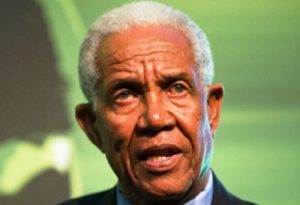
Just as Bolt played cricket before focusing on his sporting niche, so too did Sir Garfield Sobers; from a young age showed an inclination toward basketball, football, and cricket. When he was recruited at 13 by a team in the Barbados Cricket League, there was no turning back.
Some four years later, Sobers made his Test debut for the West Indies. Beginning in West Indies Cricket as a bowler, he then also became a batsman and has the fourth-highest batting average in Test cricket with over 5,000 runs. In a Test match of 1958, Sobers went on to make his maiden Test century against Pakistan and a new record of 365 for the highest individual score in an innings. In 1965 he became captain of the West Indies cricket team until 1972.
How would we describe Sobers? Simply put, ‘the best cricket player in the history of the West Indies,’ and the best all-rounder in cricket history. Sir Garfield Sobers was adept as a batsman, bowler, and fielder. He once hit six sixes in an over in a first-class match and has earned many titles including, West Indian Cricket Cricketer of the Year (1958-59) and Wisden Cricketer of the Century (2000), and was knighted in 1975 for his services to cricket.
Donned a cricketing genius, his style was marked by powerful and elegant shots, versatility, spin-balls, especially the ‘left-arm orthodox’ and ‘wrist’ spin, and fast-medium bowling, along with his ability to catch his opponent close to the wicket. Interestingly enough, Sobers was born with an extra finger on each hand which was removed at birth. Surely, Barbados would be amiss to leave this legend unrecorded; he is one of the ten National Heroes of Barbados. Sir Garfield Sobers’ superb sporting achievements dictate an addition to our literary sporting cup. Thankfully, we have Garry Sobers: My Autobiography to inspire those would-be future cricket greats.
Brian Lara
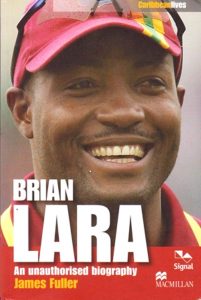 Some years later, Gary Sobers was indeed an inspiration to a young boy from Cantaro, Trinidad & Tobago, Brian Lara. At the age of twenty-one, Lara joined the West Indies cricket team and some four years later he would go on to best Sir Garfield Sobers’ thirty-six-year record with a score of 375 runs. He also broke another record with his 501 runs (not out) while playing for Warwickshire, England. While, like Sobers, Lara also had the opportunity to captain the West Indies cricket team, fans were sometimes disappointed with what they expected. Even so, as one commentator expressed after Lara in 2004 became the first batsman to retake the Test batting record with his 400 runs (not out) against England surpassing the 380 runs posted by Australian Matthew Hayden in 2003, “a remarkable human being”, shared sentiments of Lara ranking with the like of forerunner Garfield Sobers.
Some years later, Gary Sobers was indeed an inspiration to a young boy from Cantaro, Trinidad & Tobago, Brian Lara. At the age of twenty-one, Lara joined the West Indies cricket team and some four years later he would go on to best Sir Garfield Sobers’ thirty-six-year record with a score of 375 runs. He also broke another record with his 501 runs (not out) while playing for Warwickshire, England. While, like Sobers, Lara also had the opportunity to captain the West Indies cricket team, fans were sometimes disappointed with what they expected. Even so, as one commentator expressed after Lara in 2004 became the first batsman to retake the Test batting record with his 400 runs (not out) against England surpassing the 380 runs posted by Australian Matthew Hayden in 2003, “a remarkable human being”, shared sentiments of Lara ranking with the like of forerunner Garfield Sobers.
Brian Lara is the only batsman to score 100, 200, 300, 400 and 500 in first-class cricket and is the record holder for the most runs scored in an innings in both International Test Cricket and First-Class Cricket. As a renowned contemporary cricketer, he has been compared to other international cricketers such as Sachin Tendulkar. While chastised for not being as consistent as Tendulkar, Lara has given us some of the finest innings in test cricket, including 277, his first century in Test cricket, against Australia in 1993, 375 not out against England in 1994, 213 against Australia in 1999 and his 400 not out against England in 2004.
Most would agree that while we cannot claim perfection from this batsman, we have in him perfecting of purpose that we so require in our region. For one coming after Sobers, there is the ease of thinking the limit was made. Lara’s cricket career and besting of Sobers’ score simply emphasizes why we need a literary sporting cup. So it is indeed encouraging to have English journalist/author James Fuller provides us with his offering, Brian Lara: An unauthorized biography.
Fuller shares with us the shaping of this controversial cricketer who is a hero to millions worldwide. Taking us on a journey from Lara the child batting prodigy to Lara’s post-cricket life as a businessman, benefactor, and national icon, he produces a full background biography through his in-depth interviews with former international players, coaches, teachers, neighbours, friends, and family members, creating another essential for our literary sporting cup.
Shelly-Ann Fraser-Pryce
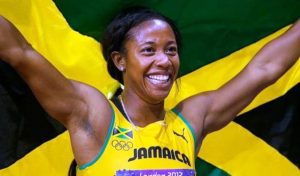 Having our own literary sporting cup for our upcoming and would-be sporting professionals to glean from is priceless. Shelly-Ann Fraser-Pryce having the example of forerunner Jamaican sprinter Merlene Ottley and coach Stephen Francis, who had guided Jamaica’s Asafa Powell to four men’s 100-meter world records, coach her is priceless. Fraser, coming from violence-plagued Waterhouse in Kingston, Jamaica, began participating in track-and-field events at the tender age of ten. Eventually, in 2007, while attending the University of Technology in Kingston, she placed fifth at the national championships and earned a silver medal at the world championships for her run in the heats of the 4 × 100-meter relay.
Having our own literary sporting cup for our upcoming and would-be sporting professionals to glean from is priceless. Shelly-Ann Fraser-Pryce having the example of forerunner Jamaican sprinter Merlene Ottley and coach Stephen Francis, who had guided Jamaica’s Asafa Powell to four men’s 100-meter world records, coach her is priceless. Fraser, coming from violence-plagued Waterhouse in Kingston, Jamaica, began participating in track-and-field events at the tender age of ten. Eventually, in 2007, while attending the University of Technology in Kingston, she placed fifth at the national championships and earned a silver medal at the world championships for her run in the heats of the 4 × 100-meter relay.
Yet, her rise in 2008 remained sudden and unexpected when in the Olympics in Beijing, she became the first Jamaican woman to win a gold medal in the 100-meter Olympic race, 10.78 seconds, a title which she retained at the 2012 Olympic Games in London. This made Fraser-Pryce the first woman to repeat 100-meter victories since American Gail Devers in 1992 and 1996. In that same Olympics of 2012, she also won a silver medal in the 200-meter.
Donned “Pocket Rocket” by a journalist, in 2009, Fraser-Pryce won the 100-meter Jamaican title at the 2009 World Championships, in Berlin, Germany, making her the second female sprinter in history to simultaneously hold both Olympic and world 100-meter titles.
If asked what has her sporting journey been, Fraser-Pryce would be sure to respond ‘priceless’, and this actually is the title for her upcoming autobiography. The autobiography titled, Pryceless Journey is due to be released in Jamaica later this year by Pelican Publishers, with its international release being finalized for a later date. Having given birth to her son, Zyon, last August, Fraser-Pryce is preparing to reenter the sporting arena. Whatever happens hereafter, she already has enough to fill part of our literary sporting cup. Pryceless Journey promises to speak to the journey of this athlete, and the disappointments that athletes must deal with to keep pushing for the pinnacle performance.
Pryceless Journey will be a collaboration between the late Ian Boyne, a television host of a Jamaican long-standing motivational programme. “We don’t document enough on the personal experiences of outstanding Jamaicans, and this book will address that deficit”, Boyne noted. Positive Thinking, Resilience and Diligent application are key themes in the autobiography. All three being qualities that Fraser-Pryce is well familiar with, notwithstanding her also addressing her disappointment at not being the first person to do the hat-trick of winning three successive gold Olympic medals. Fraser-Pryce would soon have a statue erected in her honor for the 57th celebrations of Jamaica’s independence next year.
Dwight Yorke
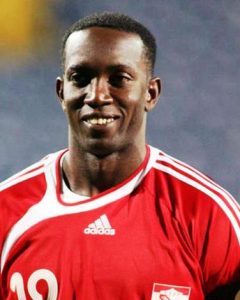 As mentioned earlier, World Cup 2018 has come and gone, leaving behind memories. For Dwight Yorke, it would be the World Cup of 2006 in Germany, where he captained the Trinidad and Tobago football team that would hold some meaningful memories. Yorke was 34 years old then. However, the Tobagonian midfielder made his football debut at age sixteen. While there have been other notable Caribbean football greats, such as Allan “Skill” Cole of Jamaica and Trinidad’s Russell Latapy and Stern John, none are as accomplished as Yorke, fondly referred to as “Yorkie”.
As mentioned earlier, World Cup 2018 has come and gone, leaving behind memories. For Dwight Yorke, it would be the World Cup of 2006 in Germany, where he captained the Trinidad and Tobago football team that would hold some meaningful memories. Yorke was 34 years old then. However, the Tobagonian midfielder made his football debut at age sixteen. While there have been other notable Caribbean football greats, such as Allan “Skill” Cole of Jamaica and Trinidad’s Russell Latapy and Stern John, none are as accomplished as Yorke, fondly referred to as “Yorkie”.
English manager, Graham Taylor, discovered Yorke while on Aston Villa’s tour of the Caribbean in 1989. Taylor both prized and priced Yorke’s performance well, with the club shelling out £120,000 to bring Yorke onboard. Throughout his sporting career, Yorke has played with Sydney FC, Birmingham City, Blackburn Rovers, Manchester United, and Aston Villa.
Donned “The Smiling Assassin” for that jovial demeanor of his ever-present during his 20-year career, Yorke captained the Sydney siders to the inaugural A-League Grand Final and received some coveted medals along with the Trinidad & Tobago Chaconia Gold Medal and around the same time, also the English Championship winner’s Medal with Sutherland.
For Yorke’s football accomplishments, there is no need to depend solely on our memories as we have Dwight Yorke: Born to Score.
Born to Score, while touching on sports and sexuality, focuses fully on all that came for this young Tobagonian football great. The lifestyle, attention, relationships, celebrity gossip, friendships, and the adventurous and sometimes turbulent journey to becoming one of the most successful and prolific Premier League goal scorers.
Surely, as a region, our cup runneth over; but what good is an outpouring if there is no one to witness it, and so we embrace all the contributions of Caribbean authors. The authors who took the time to help our region craft our own Sports Story.
By Kerriann Toby

 Kerriann Toby is a dynamic therapist currently pursuing her Doctorate of Psychology (PsyD). She is a member of the Canadian Counselling and Psychotherapy Association (CCPA) and has trained as a cybercounsellor. Her areas of experience, expertise, and interest include child development, sexual and reproductive health, gender-related matters, marriage and family life and promoting the idea of positive psychology, using strengths to support mental health and wellbeing. Visit her Wellness Blog www.karryonservices.com/blog or Facebook : Karry Morph https://www.facebook.com/ongoingProgressiveMovements/
Kerriann Toby is a dynamic therapist currently pursuing her Doctorate of Psychology (PsyD). She is a member of the Canadian Counselling and Psychotherapy Association (CCPA) and has trained as a cybercounsellor. Her areas of experience, expertise, and interest include child development, sexual and reproductive health, gender-related matters, marriage and family life and promoting the idea of positive psychology, using strengths to support mental health and wellbeing. Visit her Wellness Blog www.karryonservices.com/blog or Facebook : Karry Morph https://www.facebook.com/ongoingProgressiveMovements/

